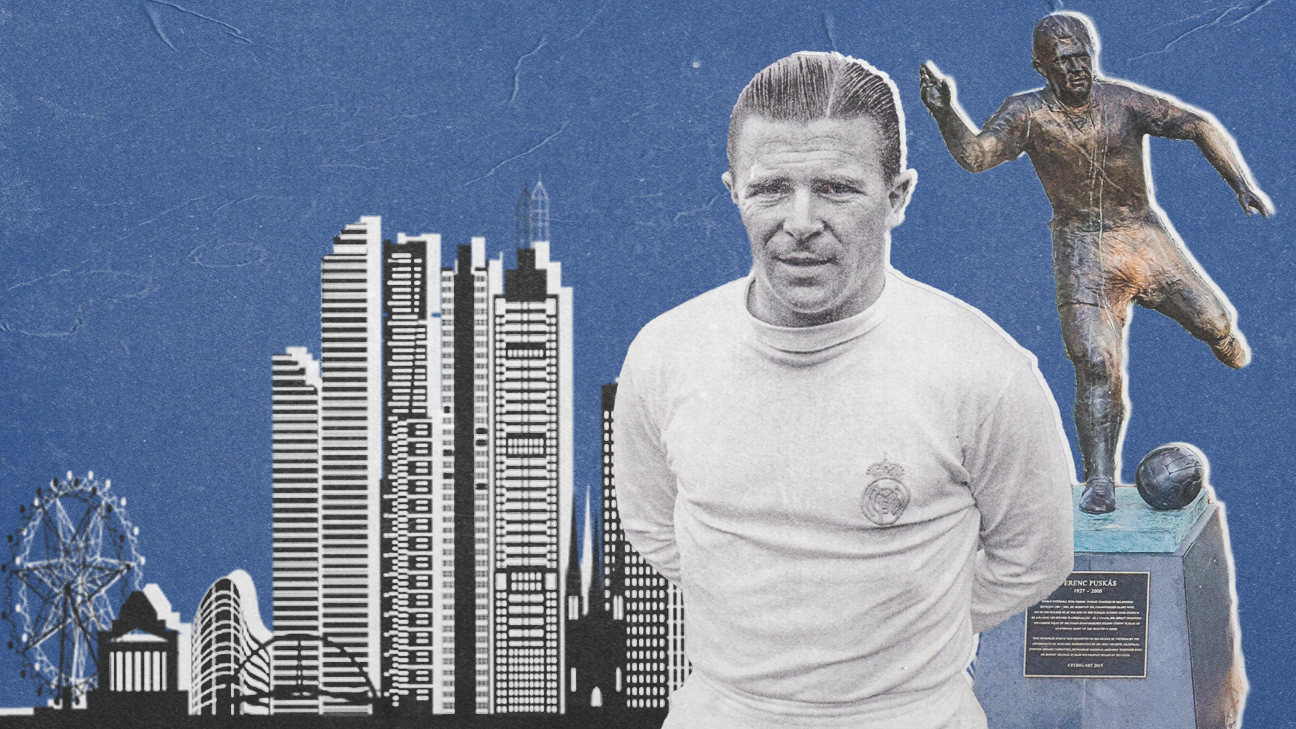Products You May Like

MELBOURNE — There are a lot of statues in Melbourne’s Olympic precinct.
Bronze statues encircle the famous Melbourne Cricket Ground, tributes to immortals of Australian sport such as Norm Smith, Betty Cuthbert and the great Sir Donald Bradman, while just across Olympic Boulevard are monuments dedicated to Bob Rose and John Landy’s immortal moment of sportsmanship with Ron Clarke. Permanent reminders of the legends of the past, they are fitting ornaments for the crown jewel of a city that, without the international renown of an Opera House or Harbour Bridge, has fashioned an identity as a cultural, artistic and preeminent athletic destination.
— Stream new episodes of ESPN FC Monday-Friday on ESPN+
– Stream every episode of 30 for 30: Soccer Stories on ESPN+
— Notebook: Lloris’ guard dog, Man Utd calm on Gomes
But elsewhere, off the boulevard and hidden away next to AAMI Park, stands a lonesome effigy of a man John Didulica, the Australian soccer players’ union boss, describes as having “the greatest story in the history of football,” Hungarian legend Ferenc Puskas.
No nation in the world had a better footballing team than Hungary in the early 1950s, and Puskas, known as “The Galloping Major,” was at its heart.
Suffering just a single defeat between 1950 and 1956, the Magnificent Magyars swept all before them on the way to gold at the 1952 Olympic Games and demolished an archaic England 6-3 and 7-1 in two friendlies, the first of which at Wembley Stadium was retrospectively dubbed “The Match of the Century.”
After arriving at the 1954 World Cup as an almost unbackable favourite, Hungary’s 3-2 final loss at the hands of West Germany, despite being up 2-0 within 10 minutes, was so unexpected that it was dubbed “The Miracle of Bern.” While the game served as a key landmark for a West Germany attempting to fashion a new national identity following World War II, so great was the outpouring of frustration and anger at the result back in Hungary that some have claimed the defeat helped lay the seeds of the Hungarian Revolution of 1956.
Disenfranchised and unable to return to his homeland due to the unrest, Puskas resurfaced two years later after signing with Real Madrid as a 31-year-old, a move that helped propel Los Blancos to heights that still echo today.
Puskas spent eight seasons with Madrid, scoring a remarkable 242 goals in 262 appearances and playing a key role in the original Galacticos sides that won five Spanish titles, the Spanish Cup and three European Cups. Sir Alex Ferguson — who was among an astonishing 127,621 at Hampden Park when Puskas scored four goals in the 1960 European Cup final — said Puskas was “without question, one of the greatest players of all time.” These days, FIFA hands out the annual Puskas Award to the individual who scored the most beautiful goal.
In short, few people in the history of football have been better than Puskas.
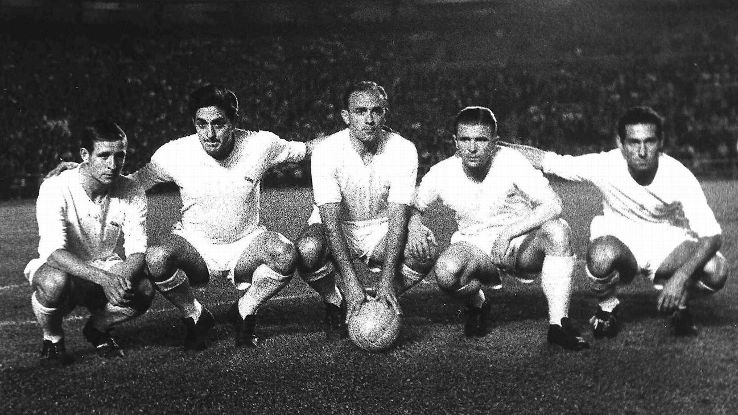
The Melbourne-based tribute, depicting Puskas in full flight as he prepares to let loose with his lethal left foot, is, therefore, a fitting one. As respectful as it is, though, it’s somewhat incongruous with the Hungarian’s actual connection to Australia. For as long and celebrated as his career was, the great forward never played a competitive game in the country, with the Hungarian revolution ahead of the 1956 Melbourne Olympics dashing Australia’s chance to see Puskas play in the flesh.
Instead, Puskas’ contributions were delivered many, many years after his playing career ended and a journeyman coaching run took him across Europe, the Americas and the Middle East. Then, almost unfathomably for a character of his esteem, the footballing titan found himself coaching South Melbourne in Australia’s National Soccer League during the late ’80s and early ’90s. But despite his celebrity — and successes — Puskas’ tenure has become an almost forgotten chapter in Australian football history.
It’s a period remarkable not only for the presence of one of the greatest of all time in what was ostensibly a footballing backwater but also because it coincided with a group of players who have gone on to play a significant part in the development of the Australian game. South’s team in the 1991 Grand Final is a veritable laundry list of figures who have propelled the sport ever forward.
Striker Joe Palatsides now serves as the Technical Director of Singapore. Fellow attacker Paul Trimboli is the Football Operations Manager at Australia’s biggest club, Melbourne Victory. Kimon Taliadoros was a founding father of Australian football’s player’s union and is now the president of Football Victoria. Midfield general Paul Wade captained the Socceroos and went on to forge a successful career in Australia’s media. Squad members Peter Tsolakis, Danny Wright and Mike Peterson all went on to coach South Melbourne, and defender Mehmet Durakovic has won multiple trophies while coaching in Malaysia.
The biggest name to emerge from the group, however, is Ange Postecoglou. After serving as Puskas’ left-back, chauffeur, translator and captain, Postecoglou went on to forge a coaching career that will likely stand alone in the pantheon of Australian coaches when all is said and done. The defender guided South to back-to-back titles in the late ’90s and repeated the feat in the A-League with Brisbane Roar before being named Socceroos boss in 2013. He led the nation to the 2014 World Cup and, after winning the Asian Cup on home soil in 2015, clinched qualification for Brazil 2018 before moving to J-League side Yokohama F. Marinos, with which he once again found success, with a league title in 2019.
“I was captain when he came to the club,” Postecoglou told ESPN. “His English wasn’t great. In fact, he couldn’t really speak any. But his Greek wasn’t bad, so I could make conversation with him, and I ended up being his interpreter.
“I was only 24 or 25 at the time. We were a young group, but he instilled a fearlessness in us. We weren’t afraid to lose or make mistakes. He just wanted us to love the game, enjoy the game, and that is something I’ve taken into my football.”
Fittingly, given the twists and turns his life had already taken, Puskas’ arrival at South 31 years ago wasn’t straightforward. The then 61-year-old originally journeyed to Australia not to lead the NSL heavyweights but to serve as a youth coach at a fledgling side in southeast Melbourne called Parkmore SC. The club’s Hungarian backers envisioned him moulding Melbourne’s most talented youngsters into potential superstars who could, taking advantage of his connections, be moved on to European clubs.
“The man that owned the club was a gentleman by the name of George Biritz,” said James Galanis, another of Puskas’ acolytes who is now the technical director of New Jersey’s Olympic Development Program and a mentor for two-time World Cup winner Carli Lloyd.
“Some issues popped up between George and Ferenc, and he gathered us up one day and said he was leaving. It happened to be that two players on the team were the sons of former South Melbourne board members. As soon as they got wind that Ferenc was leaving, they went up to him and asked: ‘Do you want us to talk to South Melbourne?’
“He said yeah, [and] they went back to South Melbourne … and they agreed terms.”
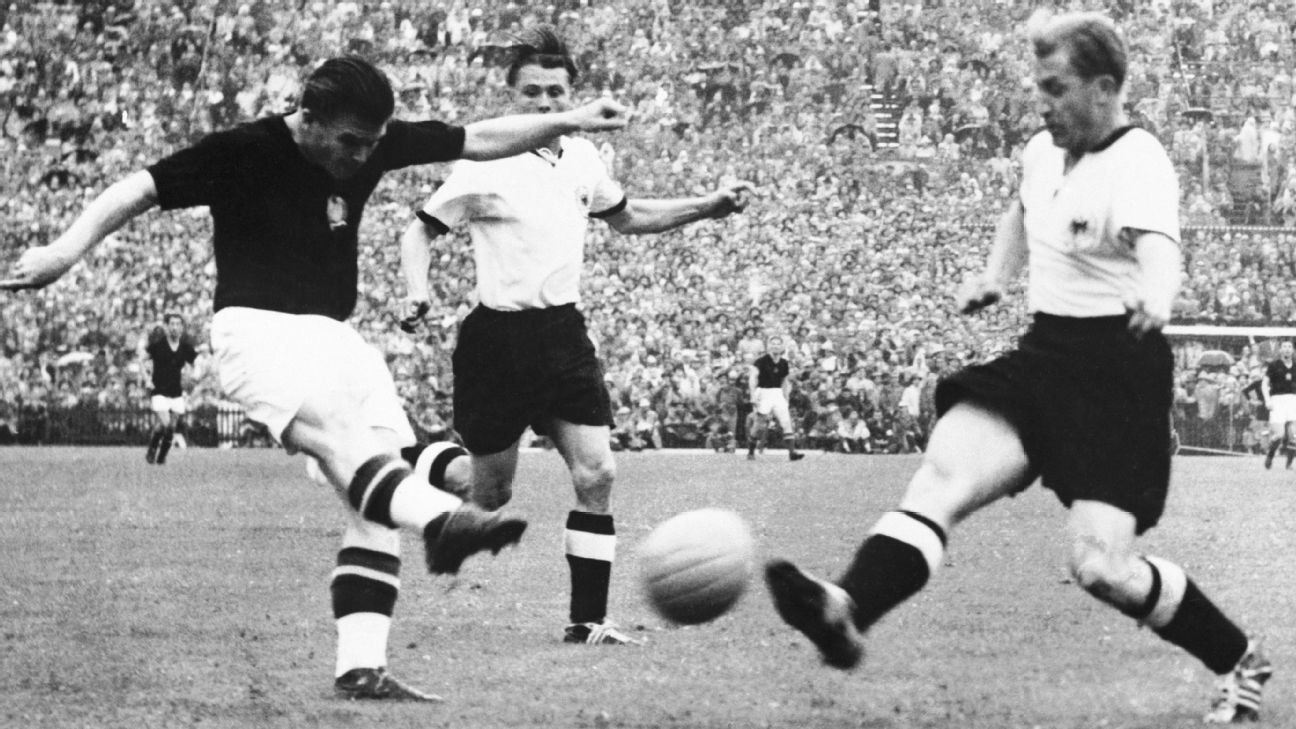
However, despite his leaving the local scene for the national stage, Puskas’ reputation, even at his new club, didn’t universally precede him, for though football is the world’s game, it definitely was not Australia’s.
“When he first arrived, we’re thinking … we actually weren’t thinking,” Wade said. “They said, ‘We’ve got a new coach called Ferenc Puskas.’
“And we’re thinking: ‘Yeah, right, good on ya. Which suburb is he from?’
“We had no idea. It wasn’t until they showed us some stuff of him playing for Real Madrid that you go, ‘S—, wow … that was a bit embarrassing.’
“But we honestly didn’t know. We were a long way from Europe, a long way from the big stage. I’m embarrassed now, but back then, we weren’t exposed to people like him.”
Australian football was still semi-professional in 1989, and the national team, aside from an appearance at the 1974 World Cup, was largely anonymous on the world stage. A small domestic scene was dominated by communities brought to Australia in a wave of post-WWII European migration that, with football serving as the glue to bring these new Australians together, led to the creation of clubs that became the backbone of the NSL.
“When he first came out, South was in the process of signing Mickey [Petersen] from Brunswick Juventus,” Tsolakis told ESPN. “And they’ve got him in the car driving to the ground, and they’re talking about ‘Juventus, Juventus, Juventus.’
“[Puskas] asked, ‘What are you worried about? I’ll make one phone call to the president, and we’ll get onto it and sort out the transfer.’
“And they had to say, ‘No, no, no, boss — it’s the Juventus in Melbourne!'”
Despite having undeniable passion and a strong community focus, the NSL was dwarfed by other sports in Australia. With the league struggling for popular recognition, crowds were relatively poor, and the clubs were largely run by volunteers rather than professionals.
“We were playing Sunshine George Cross,” said Peter Filopoulos, who was voted on to South’s board in 1995 and subsequently named the club’s first full-time general manager. “Puskas sees two blonde kids, and he says to one of our directors, ‘I want the blonde kid, blonde!’ in broken English.
“So [South Melbourne] went and signed Gary Hasler. Then Gary Hasler rocks up to training, and Puskas says, ‘Who the f— is he?’
“And he’s told that’s the player you wanted us to sign, and he says: ‘Not him! The other one!’ He meant David Clarkson, but we’d signed Gary Hasler!”
Regardless of the league’s haphazard nature, mainstream disinterest mattered little to the loyal contingent that was aware of the greatness that had arrived in the NSL, and South, undefeated at their Middle Park home, improved from eighth in 1989 to second in Puskas’ first campaign in 1989-90. While in a broader context they might paint a picture of the commercial struggles of the NSL, figures collated by Australian football stats doyen Andrew Howe show that South’s approximate gate increased to 4,240 in the first year of Puskas’ tenure, 4,966 in his second and 5,500 in his third and final season.
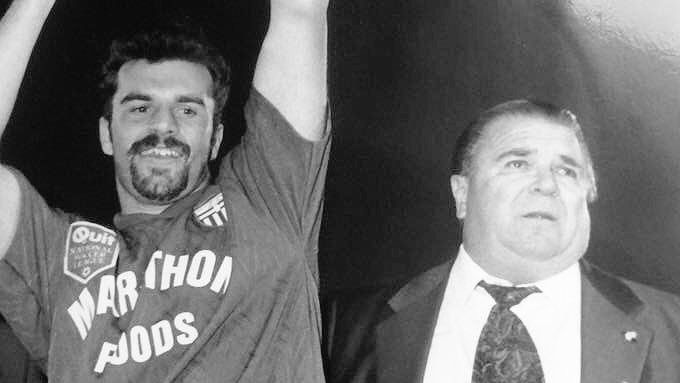
“I think it was our parents that were even more excited,” Peter Kotsiris, who produced South matchday programs during Puskas’ tenure, told ESPN. “He was of their vintage, playing through the ’50s and ’60s.
“We had only heard of the legend. We had never seen him play.”
Perhaps indicative of the instinctual ease with which he played, Puskas brought an innocently simplistic and, above all, attacking-minded tactical view of the game to South. Be it by design, coaching limitation or some level of both, his sides were allowed almost total freedom to follow their instincts and play a creative and entertaining brand of football.
“He was very simple with his coaching, very effective but very simple,” Tsolakis said. “His motto was that if you concede two goals, we’ve got to score three.”
Training sessions proved even more straightforward: lots of ball work, shooting — “Shoot the ball, boy!” — and practice games every Thursday. There was little defensive work and even less fitness training.
“He was a fantastic guy. He really was,” Palatsides said. “He probably couldn’t pass on some of the traits he had as a footballer, but we would see that even in the condition he was — he was pretty round at the time — he liked to give Bruce Maclaren some extra goalkeeping practice.
“With his left foot, [he would just] keep putting the ball in the top corner and laugh.”
That Puskas was “pretty round” by then wouldn’t have surprised many. Even in his playing heyday, he was never the leanest, and he himself feared that his move to Real would be scuppered because he was “the size of a balloon.”
Galanis recalls an evening when Puskas, invited by his father for a meal of home-cooked Greek cuisine, ended up leaving with “seven or eight bags of food.” At South Melbourne, the story of his demolition of a platter of pasta designated to feed the whole squad after a game at Marconi has taken on cult status.
“They brought out a big platter, and he pulled it towards himself, put a napkin down the collar, saturated it in salt and just proceeded to eat it,” a laughing Tsolakis said. “Then he turned around and asked, where’s our food?”
Puskas’ larger than life personality also gained him a new sobriquet in Australia.
“He wasn’t the Galloping Major to us. He was the Boss,” Wade said with a smile.
Combining slicked backed hair, sunglasses and a preference for Hugo Boss jumpers and windcheaters with an unmistakable air of confidence, Puskas left little doubt as to who was the big dog of the Middle Park yard. However, despite this intimidating aura, South’s legendary manager proved no tinpot dictator. Rather, a great affection for the coach existed among his playing group.
“It wasn’t just about what he brought as a coach. It was his whole philosophy to life and, by extension, to football,” Postecoglou said.
“He was someone that had had great success but also experienced great hardship, so he had good context. Football to him was all about the joy of the game. It was about scoring goals and loving football.”
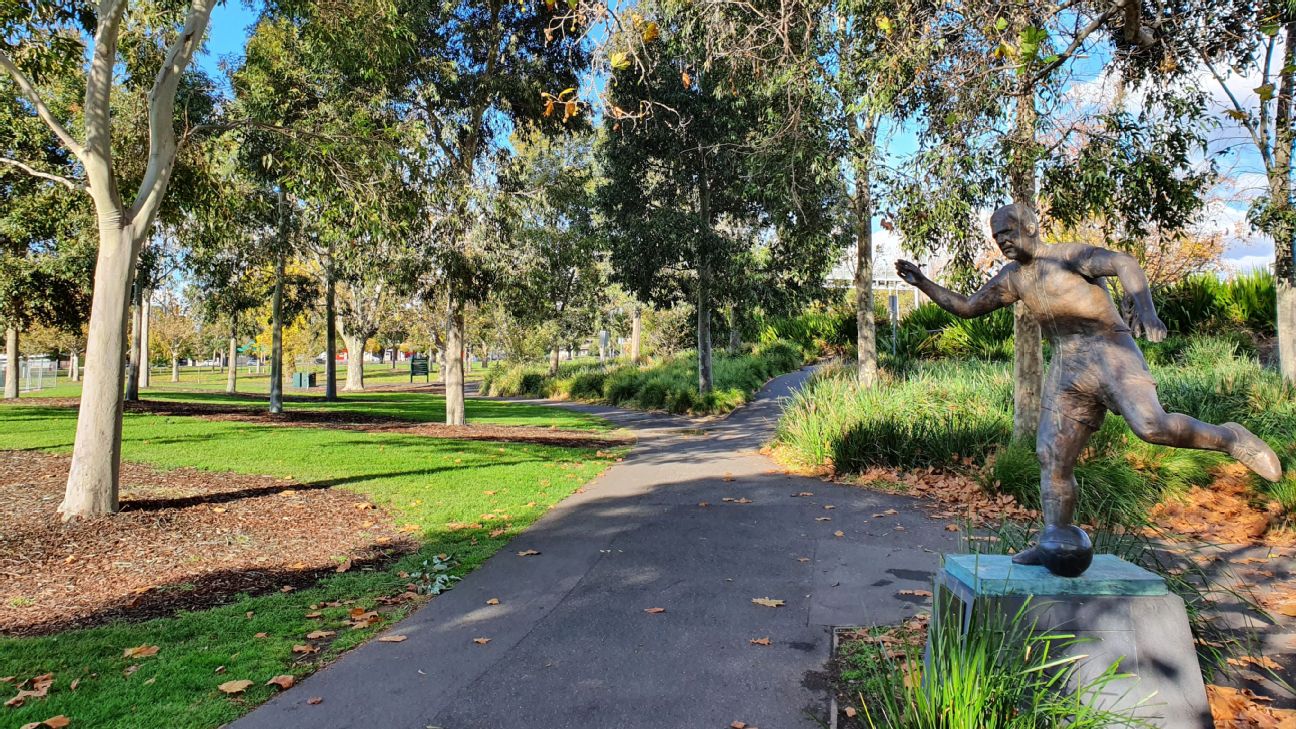
While he might have been one of the greatest to ever lace up a pair of boots, all who recounted Puskas’ time at South describe a humble figure quick to fraternise with his players, capable of great humour and the recipient of genuine affection. Tsolakis remembers him as “one of the lads,” and Palatsides, formerly Melbourne City‘s academy boss, holds him up as an example of a person, not just a player, youngsters should seek to emulate.
“Off the pitch, he was very sincere and caring. I recall he was on exceptionally good terms with all the players’ partners and families,” Taliadoros said.
“He knew them all, and he had time for everyone. You can only do that if you’re genuine and authentic and you care about people. We felt real affection, a real affection for him and from him in the group.”
Ultimately, though he coached South to one of the most famous wins in Australian footballing history — a penalty shootout Grand Final victory against bitter rivals Melbourne Croatia in 1990-91 — Puskas’ tenure at South lasted just three seasons, as, with the form of his side dipping, South opted not to renew his contract following the ’91-92 season.
“We didn’t go out and party when we heard he wasn’t coming back,” Wade said. “There was sadness there because for what he’d done, for what he’d played and seen, to be as humble as he was, was incredible.
“He’s a lesson to every so-called superstar that’s ever played the game: They should take a leaf out of his book and learn what humility looks like.”
Puskas left Australia soon after, and unfortunately, tangible links to his time in Melbourne are rare these days. The ground Puskas was most closely associated with, Middle Park, was demolished in 1994 to make way for the construction of Melbourne’s Grand Prix track, and the Olympic Park site of his 1990-91 Grand Final triumph was demolished in 2011.
All that is left is Puskas’ statue, tucked away in a little alcove next to the stadium that replaced Olympic Park, one of the few physical mementos of a time when one of the game’s greatest players — and characters — called Melbourne home.
